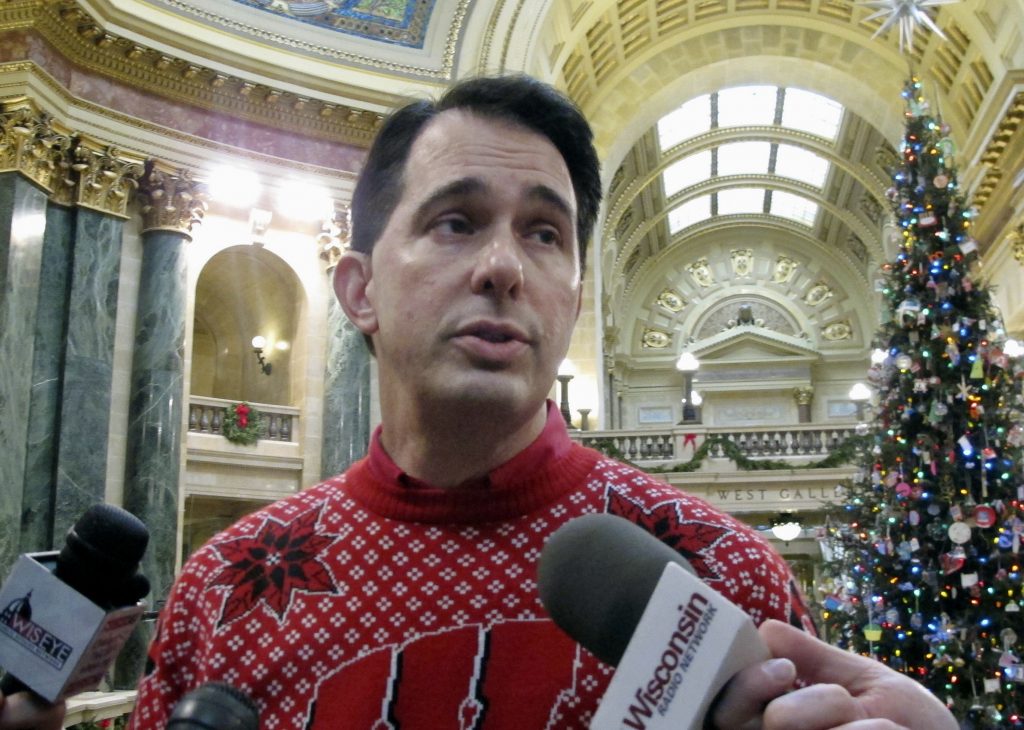Schimel defends not asking journalist for source of leak
By: Associated Press//December 7, 2017//

By SCOTT BAUER
Associated Press
MADISON, Wis. (AP) — Wisconsin Attorney General Brad Schimel didn’t ask a journalist to reveal who leaked documents to him that were collected during the investigation of Gov. Scott Walker’s campaign out of respect for the reporter’s free-speech rights, Schimel’s spokesman said Thursday.
The Republican Schimel was unable to conclude who leaked 1,300 pages of material to the Guardian following his yearlong investigation. In a report released Wednesday, Schimel recommended that disciplinary action, but no criminal charges, be taken against nine people involved in the John Doe probe into Walker’s campaign.
A John Doe investigation is similar to a grand jury in that proceedings and evidence collected is expected to remain secret.
Also on Thursday, a Republican state senator called for the resignations of the leaders and attorneys of the state’s elections and ethics commissions, which grew out of the former Government Accountability Board. All four worked for the GAB, which helped lead the Walker probe.
The Wisconsin Supreme Court in 2015 halted the investigation that resulted in millions of pages of emails and other documents being seized by investigators from Republican office holders, operatives, staff members, fundraisers and others. The court found that the coordination between Walker’s campaign and outside groups was legal.
The Guardian leak came just weeks before the U.S. Supreme Court in October 2016 declined to take the case.
Schimel determined that the documents came from the GAB office, but he was unable to pin down who had leaked them. Instead, he said systemic failures with the investigation and a lack of security led to at least 60 and maybe hundreds of people having access to emails and other material that courts had ordered to be secret.
The documents leaked to the newspaper included details of how Walker raised millions of dollars from the Wisconsin Club for Growth, a conservative group that was supposed to be independent but that coordinated fundraising to help Walker and state Senate Republicans who were targeted for recall in 2011 and 2012.
The documents also showed that Walker and the Legislature approved a bill in 2013 to retroactively protect paint manufacturers from liability after a billionaire owner of a lead producer contributed $750,000 to a political group supporting Republicans in recall elections.
Schimel’s spokesman, Johnny Koremenos, said the Guardian is known for accepting anonymous leaks and protecting leakers’ identities. It is also known for using technology that masks the ability of law-enforcement officials to determine the source of the leak, Koremenos said.
Calling the Guardian reporter in for an interview would have been an “aggressive and potentially coercive action” that Schimel did not take “out of respect for (the reporter’s) first amendment rights,” Koremenos said in an email.
He also said that approaching the Guardian “very well could have tipped off the leaker and made DOJ’s job – already a difficult one – even more difficult.” But Schimel’s investigation was far from secret. Wisconsin legislative leaders voted publicly in December 2016 to authorize him to conduct the investigation, and Schimel talked about his desire to convene a grand jury in the case.
Koremenos did not immediately respond to a follow-up question asking how the leaker could have been tipped off by DOJ contacting the newspaper.
Schimel is asking a judge overseeing the case to refer the former GAB attorney Shane Falk for discipline for violating a previous court-secrecy order. The report said that Falk’s hard drive containing secret documents cannot be found, but Falk denied being the source of the leak, according to Schimel’s report.
Schimel also asked the judge to initiate contempt proceedings against Falk; the special prosecutor Francis Schmitz; the former GAB director Kevin Kennedy; the GAB employee Molly Nagappala; Milwaukee County District Attorney Administrator James Krueger; the former GAB attorney Jonathan Becker; the Elections Commission attorney Nathan Judnic; Milwaukee Assistant District Attorney David Robles; and Milwaukee County District Attorney Investigator Robert Stelter.
Schimel said those named “grossly mishandled secret John Doe evidence and related materials and then failed to turn over all evidence as ordered by the Wisconsin Supreme Court.”
Republican Sen. Steve Nass said Thursday that Judnic, along with the Elections Commission Administrator Michael Haas; Ethics Commission Administrator Brian Bell; and Ethics Commission attorney David Buerger, should all resign.
Bell and Reid Magney, a spokesman for the Elections Commission, did not immediately reply to messages.
Legal News
- State Bar leaders remain deeply divided over special purpose trust
- Former Wisconsin college chancellor fired over porn career is fighting to keep his faculty post
- Pecker says he pledged to be Trump campaign’s ‘eyes and ears’ during 2016 race
- A conservative quest to limit diversity programs gains momentum in states
- Wisconsin prison inmate pleads not guilty to killing cellmate
- Waukesha man sentenced to 30 years for Sex Trafficking
- 12-year-old shot in Milwaukee Wednesday with ‘serious injuries’
- Milwaukee man convicted of laundering proceeds of business email compromise fraud schemes
- Giuliani, Meadows among 18 indicted in Arizona fake electors case
- Some State Bar diversity participants walk away from program
- Wisconsin court issues arrest warrant ‘in error’ for Minocqua Brewing owner
- Iranian nationals charged cyber campaign targeting U.S. Companies
WLJ People
- Power 30 Personal Injury Attorneys – Russell Nicolet
- Power 30 Personal Injury Attorneys – Benjamin Nicolet
- Power 30 Personal Injury Attorneys – Dustin T. Woehl
- Power 30 Personal Injury Attorneys – Katherine Metzger
- Power 30 Personal Injury Attorneys – Joseph Ryan
- Power 30 Personal Injury Attorneys – James M. Ryan
- Power 30 Personal Injury Attorneys – Dana Wachs
- Power 30 Personal Injury Attorneys – Mark L. Thomsen
- Power 30 Personal Injury Attorneys – Matthew Lein
- Power 30 Personal Injury Attorneys – Jeffrey A. Pitman
- Power 30 Personal Injury Attorneys – William Pemberton
- Power 30 Personal Injury Attorneys – Howard S. Sicula











